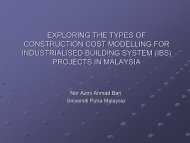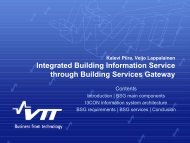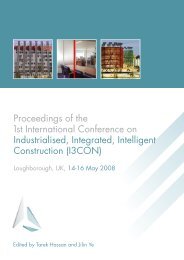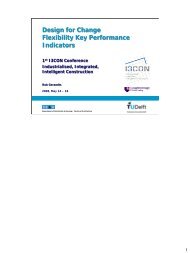Industrialised, Integrated, Intelligent sustainable Construction - I3con
Industrialised, Integrated, Intelligent sustainable Construction - I3con
Industrialised, Integrated, Intelligent sustainable Construction - I3con
You also want an ePaper? Increase the reach of your titles
YUMPU automatically turns print PDFs into web optimized ePapers that Google loves.
HANDBOOK 2 SUSTAINABLE CONSTRUCTION<br />
more <strong>sustainable</strong> facility. The history of the industry and its performance has been an essential<br />
research topic in understanding the current shortfalls of construction and will be discussed within this<br />
chapter.<br />
Objectives<br />
The aim of the work is to investigate the inclusion of Sustainable FM at the briefing and design<br />
phases of construction. The research focuses on the attitudes of different professionals and informs the<br />
industry of the potential benefits of <strong>sustainable</strong> facilities management and barriers restricting their<br />
inclusion within the early phases of construction. To achieve the aim; the objectives of the research<br />
are as follows:<br />
• To explore the sustainability agenda and the implication for the construction industry.<br />
• To establish a criterion for <strong>sustainable</strong> FM and the extent to which it can be used at the briefing<br />
and design phases of a new building, along with its benefits and potential barriers.<br />
• To examine the potential knowledge chasm between different professionals regarding Sustainable<br />
Development and FM.<br />
• To establish whether FM at the briefing and design phases of construction is a possible route<br />
towards <strong>sustainable</strong> development and meeting end-user requirements.<br />
The research has been designed in three stages. The first stage uses a comprehensive literature review<br />
to understand the background to the theory surrounding <strong>sustainable</strong> development, the construction<br />
industry and FM.<br />
Using the knowledge from the literature review, two structured questionnaires were sent to a sample<br />
of construction professionals and analysed accordingly to empirically understand the subject under<br />
research. The first questionnaire was distributed mainly to the FM professional via the British Institute<br />
of Facilities Management (BIFM). The secondary questionnaire which was structured in a similar<br />
format to the first questionnaire, further probed industry professionals regarding their attitudes<br />
towards the practice of <strong>sustainable</strong> FM at the design phases of construction. Potential barriers will be<br />
identified for their lack of inclusion within design.<br />
Background<br />
The <strong>Construction</strong> Industry<br />
Since the 1940’s, the construction industry has been continually pressured to improve its practices,<br />
sustaining criticism for its less optimal performance by several government and institutional reports.<br />
Most conclude the fragmented nature of the industry, lack of co-ordination and communication<br />
between parties, informal and unstructured learning process and lack of customer focus inhibits<br />
overall performance (Barrett 2008).<br />
<strong>Construction</strong> accounts for over 4.5% of employment within the UK (Dainty et al. 2007) warn those<br />
that choose to work in the industry experience environments characterised by structural fragmentation<br />
with wide diversity of employment practices and an endless succession of short term projects. Each<br />
project is different in terms of both the product and the people involved. Diverse groups of people are<br />
expected to readily establish co-operative working relationships while engaged on different terms and<br />
conditions (Dainty et al. 2007).<br />
Four main professional groups play a vital role in construction projects. These include Architects,<br />
Engineers, Quantity Surveyors and <strong>Construction</strong> Managers. Fragmentation exists in the division of<br />
responsibility between the professions, professionals and contractors. These groups usually operate<br />
outside construction firms as independent consultants generating a high degree of misunderstanding<br />
and hostility (Morton 2008). These conditions are the basis of the adversarial culture between<br />
contractors, sub-contractors, suppliers and their clients.<br />
215






